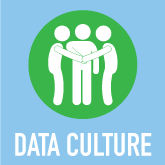Authors: Cornelia Taylor and Denise Mauzy, SRI International

“The goal is to turn data into information and information into insight.”
— Carly Fiorina, former chief executive officer and chair of Hewlett-Packard Company
We live in a data-rich world. But having data doesn’t always translate into insight, and insight is needed to make good decisions. At DaSy, we support state IDEA early intervention and early childhood special education programs in developing and enhancing their data systems for accountability and program improvement. Through this work, we have learned that data are valuable only if they are used to make better decisions. When Part C and Part B 619 program personnel have data they value, they can’t imagine doing their job without them.
Think about the data you use to do your work. Which data are most valuable to you? Why? Which data drag you down and make you reach for that third cup of coffee? Why?
These reactions reflect technology and organizational culture. To use data successfully in our jobs, we need effective, easy-to-use technology, and we need an organizational culture that expects, models, and nurtures data use.
So, what does an organization look like when data are valued or not valued?
When …
- the data are accessible to those who need them in a timely way,
- the data are shared in an easy-to-understand format,
- the organization provides enough resources (e.g., clear guidance, data system enhancements, enough paid time for data entry) to support the data collection and use, and
- staff members are expected to learn from and use the data to inform or justify decisions,
data are valued throughout the organization.
On the other hand, when …
- data are not regularly shared with the staff in a timely way,
- reports containing data are incomprehensible,
- individuals are unclear about how they should interpret and use the data,
- long-standing concerns about the accuracy of the data are not addressed, and/or
- staff members perceive that the data collection is a waste of their time,
data are not valued (and for good reason).
Do you know if your staff members value the data they collect? If you answered no, you may want to assess your data culture.
How Washington is creating a data culture
Let’s look at how the state of Washington made its child outcomes data more valuable by supporting local data culture.
- The Part C state agency identified a problem: Local program administrators didn’t know how to access or interpret child outcomes reports available through their online system.
- The state worked to address both technological and cultural barriers.
- To address data culture barriers, Washington launched a multiyear initiative to improve program administrators’ use of child outcomes data to improve their programs.
Washington’s data culture change effort has three components.
- Face-to face trainings — In the fall and spring, local program administrators gather to examine child outcomes reports and discuss the implications of the data. The use of data supports decision-making and messaging sparks the administrators’ interest. The trainings contribute to relationship building between the state team and administrators and among administrators, ensuring discussions will be respectful and safe.
- Regular checkpoints/consultation — State staff members lead individualized quarterly calls with each local program administrator to discuss child outcomes data use. During these calls, the state contact provides support tailored to the local administrator’s specific needs. This successfully builds the local administrators’ capacity to run reports and eventually leads to local administrators seeking additional data analyses beyond the reports currently available in the data system. Administrators with advanced data skills eventually develop their own hypotheses and work with the state team to find ways to test the hypotheses with additional data analyses.
- Ongoing evaluation — Every call with the local program administrators includes a short evaluation of their skills related to data use. The state team uses this information to tailor the content of the calls and evaluate the effectiveness of the initiative more broadly. The state also requires that every two years local programs complete a self-assessment of their child outcomes data collection. From those self-assessments, programs develop action plans to improve their data.
So, have Washington’s efforts to improve its data culture been successful? Overall, the initiative has improved administrator capacity to use data and has inspired curiosity about the factors that impact child outcomes in the programs. Administrators report they are more focused on child outcomes data and their use in supporting decisions. Administrators also report that it is beneficial to have time with state personnel who can answer questions, guide analysis, support data interpretation, and identify what to do next.
The state has benefited from a better understanding of the ways the local administrators access the data and the tools and supports they need to use the data effectively. The state is updating its data system reporting to respond to these needs.
Improving data culture in your state
Are you interested in turning data into insight by improving your data culture? The DaSy Data Culture Toolkit contains information, guidance, and templates to assist Part C and Part B 619 program staff with building effective data teams and supporting conditions for a culture of data use at the state and local levels. Contact DaSy if you would like assistance in using the toolkit or have other questions about data culture.


